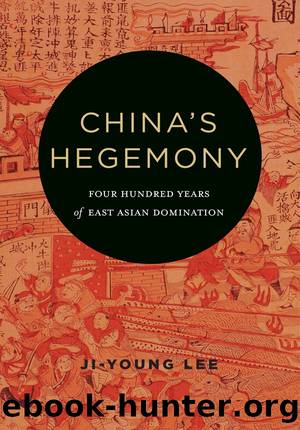China's Hegemony: Four Hundred Years of East Asian Domination by Ji-Young Lee

Author:Ji-Young Lee [Lee, Ji-Young]
Language: eng
Format: epub
Tags: History
ISBN: 9780231179744
Goodreads: 29876521
Publisher: Columbia University Press
Published: 2016-11-08T00:00:00+00:00
TOKUGAWA JAPANâS PATH TO LEGITIMATION
Why did Japan respond the way it did to the rise of the Qing empire? Why did Japan stay away from participating in the Qing hegemonic order and never normalize relations with the Qing throughout the Tokugawa period? As noted, Japanese leaders at that time did not think that Japan was particularly weak vis-Ã -vis the Manchus, and balancing was a real possibility. But, the threat perceptions and the fear that Japan held throughout the rise of Qing power led Japan to distance itself from the continent while hoping that the threats would simply pass without troubling them. One may argue that Japanâs relations with China had always been that way even before the Tokugawa periodâcommercial and cultural in nature, while not engaging politically with the Chinese center. If one focuses on economic profits, another possible explanation is that Tokugawa Japan, having created a tally trade system of its own, did not really need a direct trading relationship with the Qing. Although these explanations may be valid, they cannot explain why Japanese external relations in the early seventeenth century took the specific form of establishing a self-proclaimed miniature tributary order of its own while carefully avoiding creating any problems under the reality of Qing power. Japan chose not to challenge the Qing hegemony militarily and to accept it at a practical level while defying it through nonmilitary means.
Why did Japan take on the pretense of being a new center of Asia? I focus on the fact that the Qing empireâs rise coincided with the period of the Tokugawa leadersâ consolidation of a new political order domestically after Hideyoshiâs death, having founded a new Tokugawa state following the civil war known as the Battle of Sekigahara in 1600.128 Japanâs relations with the Qing and other neighbors in East Asia were an integral part of establishing the Tokugawa monopoly on power and authority within Japan.129 In particular, if we recall that it was in the 1630s that the basic structure of the âTokugawa world orderâ was being established, this period also witnessed the surge of domestic policies that were designed to control the great military houses across Japan that were political rivals of the Tokugawa. Throughout this period, Japan implemented a series of policies not only to keep foreign missionaries and traders from disturbing Tokugawa domestic stability but also to prevent the powerful military houses (the daimyo) from acquiring any new military technology that might upset the balance of power between themselves and the Tokugawa.130 It was also during this period that Tokugawa leaders actively courted Korea and Ryukyu to send their embassies to Japan. Upon receiving them, the Tokugawa leaders presented these foreign embassies to their domestic audiences as tribute missions coming to pay respect to them.131 Therefore, we should consider this domestic power rivalry and the authority-building context within Japan when seeking to understand Tokugawa Japanâs external relations with the Qing empire and with Korea in particular. The Tokugawa leaders used foreign relations as a means of
Download
This site does not store any files on its server. We only index and link to content provided by other sites. Please contact the content providers to delete copyright contents if any and email us, we'll remove relevant links or contents immediately.
| Africa | Americas |
| Arctic & Antarctica | Asia |
| Australia & Oceania | Europe |
| Middle East | Russia |
| United States | World |
| Ancient Civilizations | Military |
| Historical Study & Educational Resources |
Machine Learning at Scale with H2O by Gregory Keys | David Whiting(4292)
Never by Ken Follett(3937)
Fairy Tale by Stephen King(3370)
Oathbringer (The Stormlight Archive, Book 3) by Brandon Sanderson(3156)
The Man Who Died Twice by Richard Osman(3072)
Will by Will Smith(2908)
Rationality by Steven Pinker(2352)
Can't Hurt Me: Master Your Mind and Defy the Odds - Clean Edition by David Goggins(2323)
The Dark Hours by Michael Connelly(2300)
Friends, Lovers, and the Big Terrible Thing by Matthew Perry(2219)
The Dawn of Everything: A New History of Humanity by David Graeber & David Wengrow(2197)
Principles for Dealing With the Changing World Order: Why Nations Succeed and Fail by Ray Dalio(2039)
A Short History of War by Jeremy Black(1842)
HBR's 10 Must Reads 2022 by Harvard Business Review(1839)
Go Tell the Bees That I Am Gone by Diana Gabaldon(1754)
A Game of Thrones (The Illustrated Edition) by George R. R. Martin(1722)
Kingdom of Ash by Maas Sarah J(1668)
515945210 by Unknown(1660)
443319537 by Unknown(1545)
